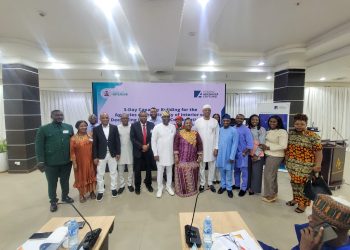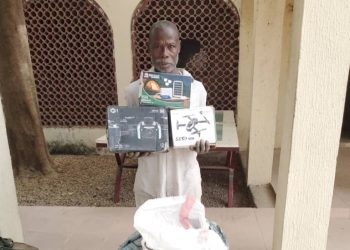By Nkechi Eze
The Director General and Chief Executive Officer of the Nigerian Meteorological Agency (NiMet), Professor Charles Anosike, has called for stronger collaboration among stakeholders in agriculture, meteorology, and technology to drive data-informed climate adaptation strategies across Nigeria’s agricultural value chain.
Prof. Anosike made this call while speaking at the symposium titled “Climate Resilience in Action: Collaborative Approaches to Adaptation,” held on Tuesday, 27th May 2025, at the Transcorp Hilton Hotel, Abuja. The high-level forum was jointly organized by NiMet, Michigan State University (MSU), Sahel Consulting Agriculture and Nutrition Ltd., and the African Agricultural Technology Foundation.
In his keynote address, the NiMet Chief emphasized the growing urgency of addressing the vulnerabilities of Nigeria’s agriculture sector to climate change impacts. He warned that increasingly erratic weather patterns, rising temperatures, and the frequency of extreme climate events such as droughts and floods are threatening food security, livelihoods, and national development goals.
“We must work together public agencies, research institutions, and private-sector innovators to deliver timely, localized climate services that farmers and policymakers can act upon,” Prof. Anosike stated.
“Only through collaboration can we turn data into practical solutions that safeguard livelihoods and food security.”
Highlighting the limitations of current infrastructure, Prof. Anosike noted that while Nigeria’s land mass spans over 924,000 square kilometers, the country’s meteorological observation network remains grossly inadequate.
“Our current observation infrastructure cannot cover the vast landscape of Nigeria. To close this gap, we must significantly scale up our Automatic Weather Stations (AWS) to ensure reliable, real-time data collection across all regions,” he added.
According to him, over 60 percent of weather data in the West African sub-region is still collected manually, often by non-professionals, resulting in poor data quality. He stressed that expanding Nigeria’s capacity for automated, accurate, and timely weather data collection is central to improving early warning systems and enhancing the precision of weather-informed agricultural advisories.
Prof. Anosike also stressed the need to embrace digital innovation and modern technologies to transform the sector, particularly the adoption of AI-powered forecasting models and mobile-based decision-support tools that can assist farmers in making climate-smart decisions.
“Artificial Intelligence is revolutionizing weather forecasting and playing a vital role in building climate resilience. The sooner we integrate these technologies into our national framework, the better prepared we will be to face current and future challenges,” he said.
He noted that NiMet is already working closely with local and international partners to build capacity, promote policy reforms, and integrate meteorological data into national planning, especially within the agriculture and disaster risk reduction sectors.
Prof. Anosike further reiterated NiMet’s readiness to partner with relevant institutions and development organizations to strengthen Nigeria’s climate resilience, especially at the grassroots level.
“At NiMet, we believe that every Nigerian regardless of location deserves access to accurate, timely, and actionable weather and climate information. Our commitment is to ensure that no community is left behind,” he concluded.
The symposium convened leading climate scientists, agricultural economists, government officials, private-sector stakeholders, and civil society actors to discuss collaborative approaches to adaptation, promote data sharing, and spotlight innovative climate solutions tailored for Nigeria’s unique socio-ecological landscape.
The event comes amid growing international recognition of the need for resilient food systems and climate-smart agriculture, especially in vulnerable regions like sub-Saharan Africa, where millions remain at risk of food insecurity due to the worsening impacts of climate change.















